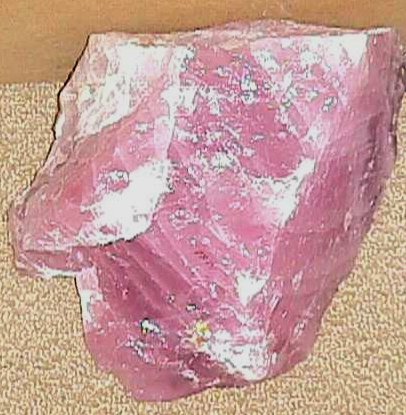 |
| Rose quartz |
American Mineralogist 86, 466-472
The Mineralogical Society of America
1015 18th St NW Ste 601, Washington, DC 20036-5274 USA
(http://www.minsocam.org)
Pink nanofibers were
extracted from rose quartz from 29 different pegmatitic and
massive vein localities throughout the world. Their width varied
from 0.1 to 0.5 micrometers. On the basis of optical absorption
spectra of the fibers and the initial rose quartz, we conclude
that these nanofibrous inclusions are the cause of coloration of
massive rose quartz worldwide. These fibers do not occur in the
rare, euhedral variety of pink quartz. Redox and heating
experiments showed that the pink color of the fibers is due to
Fe-Ti intervalence charge transfer that produces an optical
absorption band at 500 nm. Based on the XRD patterns and
characteristics of pleochroism, the best match for these
inclusions is dumortierite. FTIR and Raman spectra consistently
did not exactly match the standard dumortierite patterns,
suggesting that this fibrous nano-phase may not be dumortierite
itself, but rather a closely related material.
 |
| Rose quartz |
Errata: Table 2. XRD data
typo in the second row. The index should be 0 4 0, not 1 4
0
typo on the last row. The
index should be 2 12 2, not 1 12 2